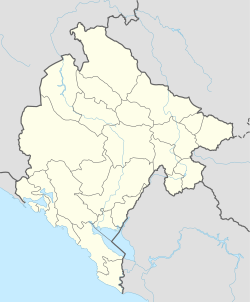Dinoša
 From Wikipedia the free encyclopedia
From Wikipedia the free encyclopedia
This article needs additional citations for verification. (January 2021) |
You can help expand this article with text translated from the corresponding article in Serbian. (September 2014) Click [show] for important translation instructions.
|
Dinoša Dinosha | |
|---|---|
Village | |
| Dinoša Диноша | |
 Aerial view of Dinoša village | |
| Coordinates: 42°24′47″N 19°20′20″E / 42.413°N 19.339°E | |
| Country | |
| Municipality | |
| Population (2011) | |
| • Total | 500 |
| Time zone | UTC+1 (CET) |
| • Summer (DST) | UTC+2 (CEST) |
Dinoša (Cyrillic: Диноша; Albanian: Dinosha) is a village in the municipality of Tuzi, Montenegro. It is one of several settlements part of the historical tribal region known as Gruda, inhabited by a majority of ethnic Albanians. Baca Kurti (c. 1807–1881) was an Albanian leader who participated in the Battle of Novšiće against the Principality of Montenegro. He is buried in Dinosha, Saint Michel's graveyard.
Demographics
[edit]According to the 2011 census, its population was 500.[1] The Albanians of this village speak in the Gheg dialect of the Albanian language. The majority of the village are Muslims, with a small Catholic minority.
| Ethnicity | Number | Percentage |
|---|---|---|
| Albanians | 475 | 95.0% |
| Montenegrins | 11 | 2.2% |
| Bosniaks | 9 | 1.8% |
| other/undeclared | 5 | 1.0% |
| Total | 500 | 100% |
Demographic history
[edit]| Year | 1948 | 1953 | 1961 | 1971 | 1981 | 1991 | 2003 | 2011 |
|---|---|---|---|---|---|---|---|---|
| Population | 272 | 377 | 457 | 575 | 669 | 570 | 520 | 500 |
In 1941, there were 308 Muslims and 69 Roman Catholics in the village.
See also
[edit]References
[edit]- ^ "Tabela N1. Stanovništvo prema nacinalnoj odnosno etničkoj pripadnosti po naseljima, Popis stanovništva, domaćinstava i stanova u Crnoj Gori 2011. godine" (in Montenegrin). Statistical Office of Montenegro. Retrieved January 27, 2012.
